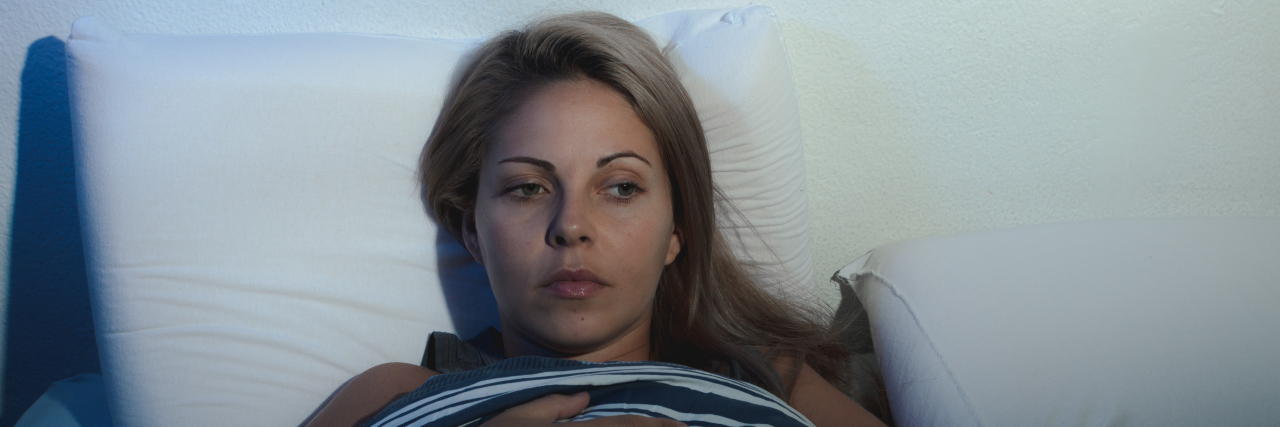Why Taking Sick Days for My Mental Health Shouldn't Be Frowned Upon
Sick days. They’re something we all get a certain amount of, and something we all take a certain amount of — some more than others. Growing up, I had the blessing of being raised by two teachers — two teachers who got it. While they might not have known at the time that I was struggling with anxiety and depression (neither did I back then), they understood that we all just need a break sometimes. My mom used to call it a “mental health day.”
To me, this meant that I was taking the day off because I was overwhelmed, rather than throwing up. I was stressed about social stuff, rather than dealing with period cramps. I was sad about everything, rather than trying to cool down a fever. To me, taking a mental health day meant that I was getting an excuse to just take the day off and relax, to press restart the following day. And maybe taking the day off to relax is exactly what I needed. It usually did the trick.
This carried over into my years in college, and has since carried over into my first few years as an adult, working full-time. And that’s where it starts to get tricky.
In high school, nobody asked where you were after you were absent because your parents called you out sick. In college, nobody asked where you were after an absence because if you didn’t show up, they didn’t care. At work, it’s a whole other ball game. While there’s no requirement for me to tell my boss why I’m taking a sick day, it’s just kind of expected that I’m either physically ill or playing hooky.
So for the past few years I have struggled with this. As a teacher, I am fortunate enough to be granted 10 sick days. Now, while I normally use up all ten by mid June when school gets out, it turns out that’s actually pretty frowned upon if anyone notices. But the thing is, taking sick days is frowned upon because people find it rare for someone to be physically ill that often, and if you are, it’s assumed that it’s for something very serious that everyone knows about.
Something serious that everyone knows about.
Isn’t my mental health something serious, just as my physical health is?
When I’m sinking back into depression, the flags are all there, but that doesn’t mean I can stop it. December is a hard month for me. While everyone is getting excited buying gifts for their families and getting ready for their holiday party, I’m usually struggling to decide where to spend my holiday; in other words, choose which parent (and their respective family unit) to celebrate with. Each parent thinks their family is the family, whereas I feel like I am being tugged at from both ends.
So it’s no wonder that just a few days ago, I blew a gasket when my eye doctor couldn’t refill my contact prescription. When I wasn’t included in the faculty golf game (again). When my landlord wouldn’t pay for my bedroom door (wtf, I know). I’m really stressed and anxious that I feel like I have to make both my mom’s family happy and my dad’s family happy, and it’s never possible for both sides to get 100 percent of me. And that anxiety leads to a panic attack over the little things that I can usually tackle on my own.
That panic attack leads to me crying, hyperventilating, crying, yelling and crying some more. This leaves me exhausted, with depression creeping up close behind. Why do I do this? Why can’t I handle this on my own? Why can’t I just deal with this? And those feelings of failure are my transition from anxiety to depression. While I know they’re irrational, in a depressive slump, it’s hard to see that so clearly.
So I took a day off. I emailed who I needed to email and I let my classes know what they needed to work on with the sub. I slept for nearly 14 hours.
When I finally turned over my phone and looked at my email, I had two that I wasn’t expecting: One from my boss and another from my mentor. While these are two people who are looking out for me at work, they’re two people who don’t need to care. But they do. While my boss normally checks in when I’m out “sick” to make sure I’m feeling OK, I normally just tell her I’m under the weather. But “under the weather” usually implies we aren’t feeling well physically. “Under the weather” is often the scapegoat phrase for “I’m too tired,” or even “hungover.”
But this time I decided to be honest. If I’m going to take a sick day, it’s OK for that to be physically sick or mentally drained. I told her the truth, and what I got back was understanding and care. While I may be fortunate enough to work in an environment where (some of) my higher-ups really do care, I know this is not the case for us all. But what I do know is that for those of us struggling with mental health issues, whether they be short-term or long-term, it’s important for us to take the time we need to heal, just as we would if we were actually “under the weather.”
Mental health is something that we need to talk about more. We need to be more open about, and we need to be more accepting, of both our own and others’ as well.
Take the time you need to heal.
Take care of yourself.
Breathe.
Follow this journey here.
Getty image via klebercordeiro

